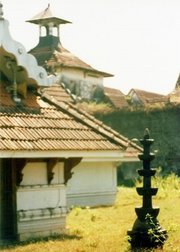Kochi, India
|
|
Kochi (formerly known as Cochin) is the largest (pop. 1,140,605 in 1991) city in the state of Kerala, India, and is its principal seaport. The city derives its name from the Malayalam word "Kochazhi" meaning small lagoon. This was shortened to Cochin by the westerners for easy pronunciation. The city reverted back to its original name Kochi in 1996. This change in name was challenged by the city municipal corporation and officially, the city is still called "Cochin".
Also known as "Queen of the Arabian Sea", Kochi is located in the district of Ernakulam, about 220 km. north of the state capital Thiruvananthapuram. Old Kochi loosely refers to a group of islands which comprise Willingdon Island, Fort Kochi, Mattancherry, etc. Today Kochi includes Ernakulam city, old parts of Kochi, Kumbalangi, and outlying islands.
The city
KochiFishingNet.jpg
Kochi was famous for its natural harbour and was the centre of the Indian spice trade for many centuries. It is home to a naval base and an airport, and is well connected to all the major Indian cities. Willingdon Island is a large artificial island, created by dredging the Vembanad Lake under Lord Willingdon's direction. A large shipyard makes ships, especially cruisers and carriers for the Indian Navy, and straddles Willingdon Island.
Fort Kochi, situated on the Fort Kochi/Mattancherry peninsula, is the historical part of the city and home to most of the tourist attractions, such as the cantilevered Chinese fishing nets, the Dutch Palace and the Santa Cruz Basilica. Most economic activity is now centred in Ernakulam, however.
Kochi is well connected to other parts of the world through roads, rail and air. There is an international airport called Cochin International Airport which is around 25kms from the city. The Cochin University of Science and Technology (CUSAT) is located in Kochi, as are many other educational institutions. The Maharaja's College, which has seen the best of literary figures within its faculty and its students, is one of them. Kochi has a lot of sight seeing places. Some of them are the Bolgatty palace, Chinese fishing nets, boating through the back waters, the Tripunithura Palace (also called Hill Palace; on the top of a hill). There are two railway stations which are very close to the city and have trains to all the places in the country.
History and heritage
Cochin was once controlled by the Netherlands; the city and its territory were ceded to the United Kingdom in the Anglo-Dutch Treaty of 1814 in exchange for the island of Banca.
Cochin_Jewish_Inscription.JPG
The synagogue in Kochi is the oldest in India. Kochi was a major settlement for a large Jewish community, which figured prominently in the business and economic strata of Kochi society. They were known as Malabar Yehuden and now increasingly as Cochin Jews. The community has now almost entirely migrated to Israel and the United States. The copper tablets presented to them in ancient times were shipped to Kennedy Airport Sanctuary where they are on display. Kochi now has a multicultural and secular community comprising Hindus, Christians, Muslims, Jains, Sikhs and other denominations. Syrian Orthodoxy was the sole Christian tradition in Cochin for a long time. However, since the Portuguese invasion of the princely state of Cochin (then known as Perumpadapu Swaroopam) in the 1500s, Roman Catholicism has been a dominant force in the city. Kochi also harboured the grave of Vasco da Gama, the Portuguese explorer, who was buried at St. Francis Church until his remains were returned to Portugal in 1539.de:Kochi (Indien) fr:Kochi (Inde) hi:कोचीन pt:Cochim

